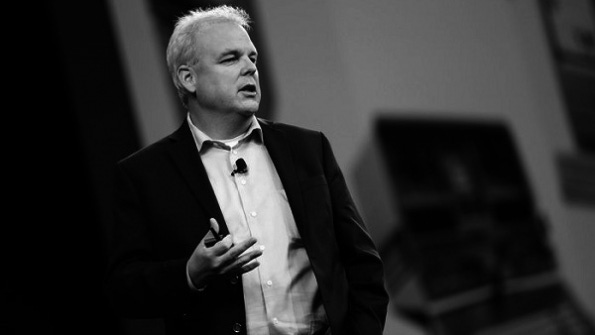Last week, Hewlett-Packard (HPQ) announced its plan to build a revolutionary new type of computer called The Machine. And here's what makes it truly revolutionary, in all senses of the word: The Machine will run an open source operating system developed in universities, as well as Linux and Android.

Last week, Hewlett-Packard (HPQ) announced its plan to build a revolutionary new type of computer called The Machine. And here's what makes it truly revolutionary, in all senses of the word: The Machine will run an open source operating system developed in universities, as well as Linux and Android.
Most of the buzz so far about the project known as The Machine, which HP made public last week, involves radically innovative types of storage in the form of "memristors." Those are non-volatile memory that could store a data center's worth of information on a single computer or phone using virtually no power, according to HP. Leveraging non-volatile memory in a practical way for server, desktop and mobile computing is the core goal of the project.
But there's something else revolutionary in the works, too. That's HP's plan "to build a new operating system all open source from the ground up, optimized for non-volatile memory systems," to power The Machine, according to Martin Fink, HP CTO, director of HP Labs and general manager of HP's Cloud business unit.
Actually, HP wants to build three new, apparently distinct operating systems for The Machine. One will be based on Linux and another on Android (which is also a form of Linux, technically), while the third will be the original work of HP in conjunction with academic institutions around the world. "We want to reignite in all of our universities around the world operating system research which we think has been dormant or stagnant for decades," Fink said.
That initiative is what makes The Machine truly revolutionary on the software front. And when I say revolutionary, I'm thinking both of the older definition of the word, when it referred to things that were cyclical—i.e., that revolved—as well as the modern sense evoking radical upheaval. The new open source OS HP wants to build will do both things.
By promising to engage with universities to develop the OS, HP is restoring the focus to the academic environments that gave rise to Unix (including the University of California at Berkeley's variant, BSD, upon which Apple's (AAPL) OS X is based) and the other operating systems that powered computers for decades, long before private companies took the helm. HP apparently thinks Microsoft (MSFT), Apple and the like are no longer innovative enough to build the OS software of the future, and that universities can do a better job, as they did decades ago.
At the same time, HP is being revolutionary in the other sense of the word by seeking to rupture the co-dependency between PC vendors and Microsoft that has formed the basis for the hardware market since the 1990s. However The Machine's OS shapes up, it will not be Windows, and HP will not have to depend on Microsoft to sell its products. That would be a first, since no major PC maker today offers a serious alternative to Windows-based machines (Dell's paltry assortment of Ubuntu-powered computers notwithstanding).
Of course, for now The Machine remains a nebulous concept, not something HP actually will be selling anytime in the near future. Machines based on The Machine concept may never even fully materialize. But if they do, they'll revolutionize hardware and software in all respects.
About the Author(s)
You May Also Like


